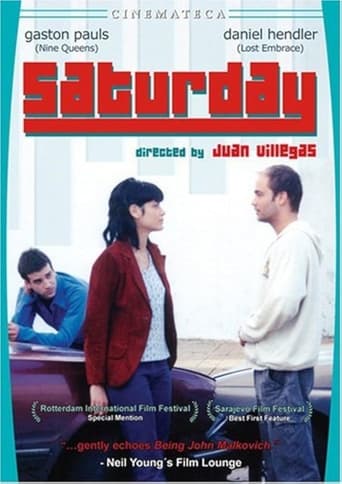j-acosta
I have just watched this movie on a Latin channel here in Miami. I found it incredibly boring and full of overstretched nonsense dialogues that are as dumb as they can get. Even for an Argentine like me this Argentine movie was pointless so I can assume it is even more boring for non-Argentine viewers.I cannot think of a good reason why this movie was even made. I cannot stress enough how tedious the dialogues are (e.g.: "-It's strange two meet you twice in the same date. -It can happen. -But it's strange. -But it can happen. -But it's strange. -Yeah, but, you know, it can happen"). Enough said.No message, no plot. Invest your 72 minutes in something else.
groggo
Maybe I'm getting too grumpy and too particular, but Sabado (Saturday) is basically a juiced-up six-character play with outdoor scenes.The object of this film, which extends (mercifully) for only 72 minutes, is to show human alienation. It doesn't really succeed. What it does show is human tedium and boredom; it shows, rather unconvincingly, people who are looking for a little spice in their dismal lives.After watching the master of human detachment or alienation, England's Mike Leigh, Sabado emerges as a pretty unsatisfactory statement on the same subject, this time in the destructive restrictions of IMF, which ripped Argentina's (among other countries) economy apart. It does show, quite well it seems, the frustration of youngish (but not that young) people who are never quite sure what they want.There is some quirky humour in this film, but it could have used a lot more. When you compare this to 'Naked,' Leigh's 1993 masterwork on alienation (and wicked dark humour), Sabado just limps along, too static and not very powerful. There is another great film I recall -- 'Humanite,' by France's Mario Dumont, that depicts alienation with such vividness that it is all but tactile.
jotix100
Juan Villegas, who also wrote the screen play for "Sabado", is a young Argentine talent whose work amazes for the interesting way he presents us six different young people living in that great metropolis. Their Buenos Aires, though, is not the touristy place we have watched in other films. Much of it takes place in the outlying neighborhoods where these aimless souls tend to gravitate.The basic premise of the film is about three different couples in various degrees of straining apart from their relationships as they intermingle with each other in plausible situations. Mr. Villegas' cinema might well be influenced by Eric Rohmer, as he has confessed. We can also equate it to Jim Jarmusch, and Richard Linkletter, and even Martin Reijtman, three other directors that have dealt with aimless youth in their search for a place in the sun.There is Gaston Pauls, a somewhat famous actor, whose name was made when he appeared in "9 Queens". When Gaston's car collides with the one Martin and Natalia are riding, it is the first instance where these lives touch. Gaston, who is seen with Andrea, an wishy-washy woman who doesn't seem to make up her mind. Later on, Andrea will meet Martin. The other couple, Leopoldo and Camila, seem to be having their own problems. Camila, who is about to interview Gaston, is a bit fed up with Leopoldo. On the other hand, Natalia and Leopoldo connect in an unexpected way.Where Juan Villegas succeeded is with the way he wrote the dialog for this film. The length of the picture, at 72 minutes of screen time, is just the perfect amount for what the six characters will go through in the movie. The interaction is sharp and without artifice. The inside joke seems to involve the way people tend to mispronounce Mr. Pauls last name and the corrections, he and the ones that are "in the know" seem to tell the others.The film shows six interesting actors from Argentina. Gaston Pauls is the best known face in the cast, but the excellent Daniel Hendler also makes an appearance as Martin. We enjoyed the terse intelligent responses of Camila Toker, who tells it like she sees it. Mariana Anghileri, Leonardo Murua and Eva Sola do also good work for Mr. Villegas."Sabado" shows a young director who shows great promise and who will go to the top of his profession.
Spleen
Six youngish people with no particular history - we follow their "stories" severally - wander around the city aimlessly for twenty-four hours or so, every now and then running into one another. (In two cases they literally run into one another, which may have been a joke, although I'm not sure the pun would make sense in Spanish.) This film isn't quite as mind-numbingly tedious as its closest Australian equivalent, "City Loop", because the characters are not completely gormless and unpleasant, and the dialogue, considered in itself, is actually rather good, even in subtitled form. There's even something that makes it worth watching: a funny joke one of the characters tells about ten minutes in, in a delightfully abstract way, as if she doesn't realise it's a joke at all. Since it's the best thing in the film I won't give away the punchline. Besides, you'll want to tell it to your friends; they won't have seen the film, so you'll be safe.Someone should do a study, to see if people who make this kind of pointless movie in order to learn the mechanics of film-making actually go on to make worthwhile films. I suspect not. The lack of creativity is a bit too desperate. Of all the films of this type I've seen this one has the most unmotivated and abrupt ending, as if the director, like the audience, had thought the 72-minute mark would never arrive and was only too eager to call it a day when it did.



